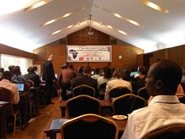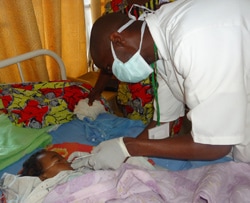Purpose
- The African Network for Influenza Surveillance and Epidemiology (ANISE) is a network of experts who work to strengthen surveillance and research capacity for influenza (flu) and other respiratory diseases in Africa.
- The network helps to facilitate laboratory and epidemiologic capacity building for flu and other respiratory disease surveillance.

About ANISE
ANISE was founded in 2009 and currently has more than 260 members from more than 30 countries working on improving detection, case management, control, and prevention of flu and other respiratory viruses in Africa. The network aims to highlight best practices and the latest research for prevention and control, as well as pandemic preparedness.
The ANISE Network is made up of laboratorians, epidemiologists, public health officials, clinicians, veterinarians, researchers, and policy makers.
The importance of ANISE in Africa
This network is particularly important because while the impact of flu has been well studied in developed settings, flu may have a different impact in lesser resourced settings, like in Africa, due to untreated co-morbidities, malnutrition, and other factors.

ANISE priorities
- Generate and disseminate data on the burden and epidemiology of flu in Africa.
- Share and promote use of standardized surveillance methods in the region.
- Coordinate and provide laboratory and epidemiologic support for the continued surveillance of seasonal flu and for the detection of viruses with pandemic potential.
ANISE Network impact
ANISE has promoted the use of standardized protocols for surveillance of respiratory illnesses with the vision to estimate flu-related disease and economic burden in the continent, generating evidence-based data to support public health interventions and relevant changes in policy.
Another important activity for the network is to facilitate capacity building through collaboration in epidemiology, laboratory, and surveillance efforts. This has been achieved through one-to-one exchanges between members of various participating countries and also through convening workshops on topics such as data management, scientific writing, molecular diagnostic methods, and disease burden estimation.

Collaboration among participating countries has led to important studies such as:
- Timing of seasonal influenza epidemics for 25 countries in Africa during 2010–19: a retrospective analysis published in The Lancet Global Health in 2023, identifying timing for seasonal flu epidemics for 25 countries in Africa.
- Severe acute respiratory illness deaths in Sub-Saharan Africa and the role of influenza: a case-series from 8 countries and a supplement published in the Journal of Infectious Diseases in 2012 which focused on flu in Africa and included more than 25 articles with original data from Africa.
ANISE members can use the network to coordinate with one another and provide laboratory and epidemiologic support to other members.
